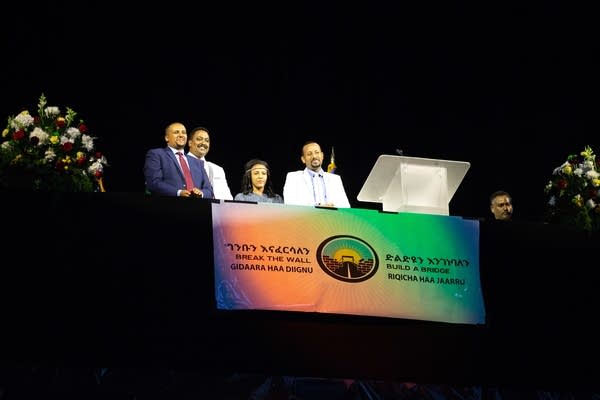Finally, Minnesota's Ethiopians feel free to visit their homeland

Some of Minnesota's estimated 22,000 Ethiopian immigrants have long wanted to visit their homeland, pining for familiar foods or traditions and the embrace of family. But such visits were made impossible by the threat of political persecution — or worse.
This year, though, things changed. A young, new prime minister came to power. And although Abiy Ahmed took office just last April, he's electrified not only his nation but his compatriots scattered across the world.
The prime minister has given hope to Twin Cities journalist Ahmed Wassie, who is eager to visit a homeland he has not set foot in for nearly half a century.
"I haven't seen my mother for 46 years," said Wassie, the host of the weekly community radio show "Voices of Ethiopia" on KFAI. "The first thing I'm going to do is kiss the ground when I get to the airport. The next is hug my mom, hug my friends. For a month, I want to see the country I left when I was 18 years old."
Create a More Connected Minnesota
MPR News is your trusted resource for the news you need. With your support, MPR News brings accessible, courageous journalism and authentic conversation to everyone - free of paywalls and barriers. Your gift makes a difference.
Wassie said after he graduated from the University of Minnesota, he thought he would stay just a year or so. But there was too much turmoil back home. And while living in the United States, he openly criticized the Ethiopian government — first as a student activist, and then on his radio show. Wassie said his life would have been in danger if he'd returned.
Wassie said until now, he has never seen a leader unite a country spanning more than 80 ethnic groups and press so boldly toward reform. Abiy has released thousands of political prisoners and signed a peace deal with rival Eritrea. The two nations reopened their shared border this week for the first time in 20 years.

At the same time, the prime minister is inviting Ethiopians who have been living in exile to return to their birthplace. He's even offering hotel discounts, Wassie said.
"He welcomed us now," Wassie said. "He said, 'All of the people against the Ethiopian government, this is your home, come back.' The old regime, all they knew was how to kill people, how to imprison people. Our country was a laughingstock in Africa. But now I think democracy is in our reach."
Ethiopians began fleeing violence in large numbers in the 1980s. Minnesota is now home to one of the largest Ethiopian communities in the United States. Community leaders believe the population in Minnesota is even larger than the Census estimate of 22,000.
Ahmed Issahak has built a life in the Twin Cities in the decade since he left Ethiopia. He is Oromo, a member of Ethiopia's largest ethnic group, which has faced historical persecution from the government. Now, as a U.S. citizen and a structural engineer, he lives with his family in a spacious home in Brooklyn Park.

Until Abiy took office, Issahak was wary of ever returning to his homeland. To this day, he doesn't know what happened to an uncle who supported the Oromo Liberation Front and disappeared many years ago.
"I have seen most of my friends' fathers and brothers taken away, and we don't even know where they were," he said. "People got killed for just waving a flag."
Issahak has dreams of expanding his consulting business and helping to rebuild Ethiopia. The country plans to loosen its control of the telecom industry, something Issahak hopes to take part in.
The U.S. State Department still urges people to use caution while traveling to parts of Ethiopia, citing the potential for civil unrest. But Issahak said he knows of others who've already flown there over the past few months.
"A lot of them are like myself, haven't gone back home since they came here," he said. "They want to reunite with their family. It's exciting to go back to where you're born and have a lot of memories."
Issahak is networking now and plans to head to Ethiopia with his family next summer. He said he's enticed by the opportunity to do business in one of Africa's fastest-growing economies. But he also sees it as a chance to nurture and invest in the place that birthed him.

Twin Cities attorney Mawerdi Hamid, 31, said other young people are equally excited. Hamid, who helped welcome the prime minister to Minnesota in July, said the Ethiopian government sees the diaspora — especially a young generation educated in the West — as key to its future.
Hamid said she wants to one day help Ethiopians craft a legal system that is fair and transparent.
"We live in a country that has the most to offer," said Hamid, a U.S. citizen. "We're lucky to be able to live here in America, and to have this quality education and training. Many of us were born here or grew up here but want to give back."
In July, Mohammed Ademo, a graduate of the University of Minnesota Duluth and co-creator of the website OPride.com, moved back to Ethiopia — for good. He described the pace and level of change in his homeland "breathtaking," and said he wants to help make the country more equal and fair for all citizens.
He said he's been meeting people near the capital city, Addis Ababa, and reuniting with family members and mourning those who've passed away. "Much has changed in the years I have been away," he said. "It is liberating to be home and to be able to move around freely and engage with people. There is truly nothing like home."